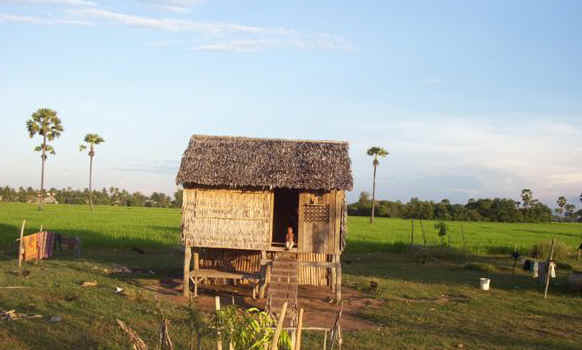Pumi (ភូមិ pronounced Poom, which means Village in Khmer) is an Open Source library containing Geodata for administrative regions in Cambodia including Provinces, Districts, Communes and Villages.
A JSON API is available to if you're not using Ruby or if you just don't want to install a local copy of the data. The API Start Page also shows a Demo of a UI for for entering any location in Cambodia.
Using Pumi with Rails gives you some javascript helpers as well as an API to filter and select Provinces (ខេត្ត), Districts (ស្រុក / ខណ្ឌ), Communes (ឃុំ / សង្កាត់) and Villages (ភូមិ) in both latin and Khmer as seen below and in the Pumi API Start Page
To use Pumi with Rails first, require "pumi/rails" in your Gemfile:
gem "pumi", require: "pumi/rails"Next, mount the Pumi routes in config/routes
# config/routes.rb
mount Pumi::Engine => "/pumi"Then require the pumi javascript in app/assets/javascripts/application.js
//= require jquery
//= require pumiNote: jquery is a dependency of pumi and must be required before pumi
Finally setup your view with selects for the province, district, commune and village. See the dummy application for an example and refer to the configuration below.
Rails is not a dependency of Pumi so you can use it with Plain Ol' Ruby if you don't need the javascript and route helpers.
Add this line to your application's Gemfile:
gem "pumi"And then execute:
$ bundle
require 'pumi'
# Working with Provinces (ខេត្ត)
# Get all provinces
Pumi::Province.all
# Find a province by id
Pumi::Province.find_by_id("12")
# Find a province by its latin name
Pumi::Province.where(name_latin: "Phnom Penh")
# Find a province by its Khmer name
Pumi::Province.where(name_km: "បន្ទាយមានជ័យ")
# Get a list of links for a province
province = Pumi::Province.find_by_id("12")
province.links
# => {:wikipedia=>"https://en.wikipedia.org/wiki/Phnom_Penh"}
# Get Geodata
province.geodata
# => #<struct Pumi::Geodata lat="11.5730391", long="104.857807", bounding_box=["11.4200852", "11.7349524", "104.7204046", "105.0440261"]>
# Get ISO3166_2 code
province.iso3166_2
# => "KH-12"
# Working with Districts (ស្រុក / ខណ្ឌ)
# Get all districts
Pumi::District.all
# Get all districts by province_id
Pumi::District.where(province_id: "12")
# Find district by its Khmer name and Province ID
district = Pumi::District.where(province_id: "12", name_km: "ចំការមន").first
# Return the district's province name in latin
district.province.name_latin
# => "Phnom Penh"
# Return the district's province name in UNGEGN
district.province.name_ungegn
# => "Phnum Pénh"
# Working with Communes (ឃុំ / សង្កាត់)
# Get all communes by district_id
Pumi::Commune.where(district_id: "1201")
# Find a commune by its latin name and District ID
commune = Pumi::Commune.where(district_id: "1201", name_latin: "Tonle Basak").first
# Return the commune's district name in Khmer
commune.district.name_km
# => "ចំការមន"
# Return the commune's province name in Khmer
commune.province.name_km
# => "ភ្នំពេញ"
# Working with Villages (ភូមិ)
# Get all villages by commune_id
Pumi::Village.where(commune_id: "010201")
# Find a village by it's Khmer name and Commune ID
village = Pumi::Village.where(commune_id: "010201", name_km: "អូរធំ").first
# Return the village's commune name in latin
village.commune.name_latin
# => "Banteay Neang"
# Return the village's district name in Khmer
village.district.name_km
=> "មង្គលបូរី"
# Return the village's province name in Khmer
village.province.name_km
# => "បន្ទាយមានជ័យ"
# Get the villages address in Latin
village.address_latin
# => "Phum Ou Thum, Khum Banteay Neang, Srok Mongkol Borei, Khaet Banteay Meanchey"
# In English
village.address_en
# => "Ou Thum Village, Banteay Neang Commune, Mongkol Borei District, Banteay Meanchey Province"
# In Khmer
village.address_en
# => "ភូមិអូរធំ ឃុំបន្ទាយនាង ស្រុកមង្គលបូរី ខេត្តបន្ទាយមានជ័យ"The following html5 data-attributes can be used to configure Pumi.
data-pumi-select-id- A unique id of the select input which is looked up by
data-pumi-select-target data-pumi-select-target- The
data-pumi-select-idof the select input in which to update the options when this input is changed data-pumi-select-collection-url- The url in which to lookup the values for this select input. If this option is not given then no ajax request will be made. Hint: You can use the Rails url helpers here e.g.
pumi.districts_path(:province_id => "FILTER") data-pumi-select-collection-url-filter-interpolation-key- The key value to interpolate for filtering via the collection url. E.g. if you set
data-pumi-select-collection-url="/pumi/districts?province_id=FILTER", then a value of"FILTER"here will replace the collection URL with the value of the select input which this select input is the target of data-pumi-select-collection-label-method- The name of the label method. E.g.
data-pumi-select-collection-label-method="name_en"will display the labels in Latin ordata-pumi-select-collection-label-method="name_km"will display the labels in Khmer data-pumi-select-collection-value-method- The name of the value method. E.g.
data-pumi-select-collection-value-method="id"will set the value of the select input to the Pumi of the location data-pumi-select-disabled-target- The target of a parent selector in which to apply the class
data-pumi-select-disabled-classto when the input is disabled data-pumi-select-disabled-class- When the input is disabled this class will be applied to
data-pumi-select-disabled-target data-pumi-select-populate-on-load- Set to true to populate the select input with options on load. Default: false
data-pumi-select-has-hidden-value- Set to true if you also have a hidden field for this input with the same name. Useful for remembering the selection across page reloads. Default: false
After checking out the repo, run bin/setup to install dependencies. Then, run rake spec to run the tests. You can also run bin/console for an interactive prompt that will allow you to experiment.
To install this gem onto your local machine, run bundle exec rake install. To release a new version, update the version number in version.rb, and then run bundle exec rake release, which will create a git tag for the version, push git commits and tags, and push the .gem file to rubygems.org.
Bug reports and pull requests are welcome on GitHub at https://github.com/dwilkie/pumi.


